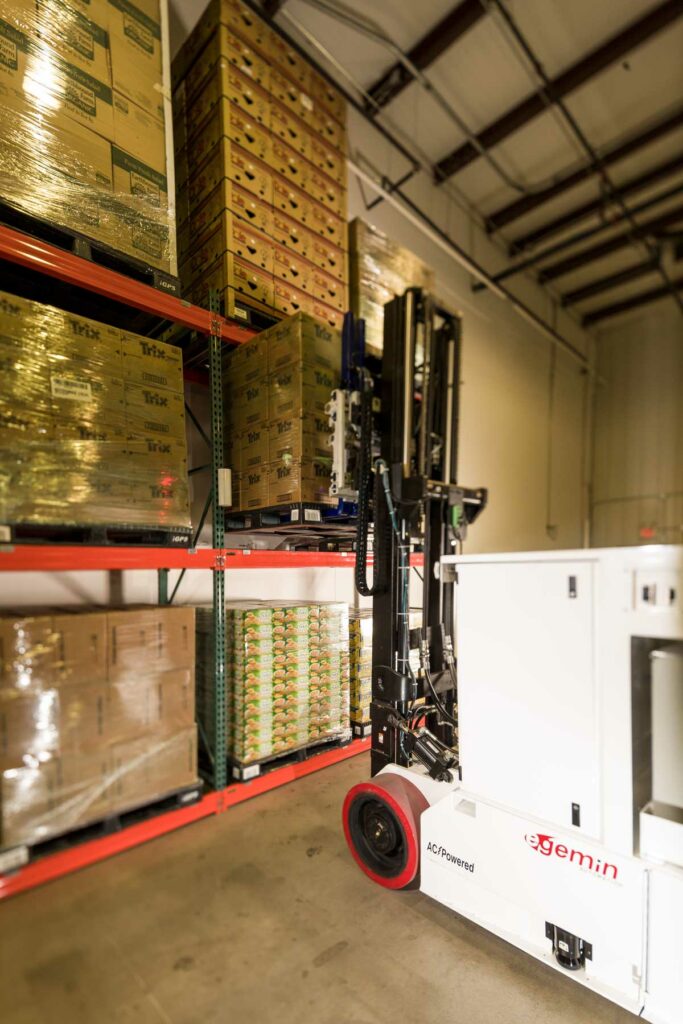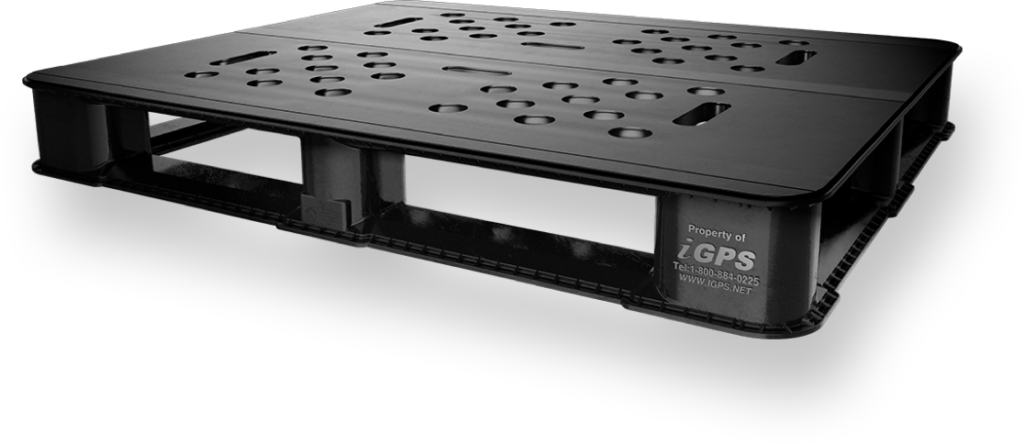Few things are as dangerous or disruptive as a pallet breaking under a heavy load. The CBA spec wood block pallets that most grocery and produce packaged goods are shipped on are only rated for an evenly distributed 2,800-pound load. While a shipment of 16-ounce bottled water weighs in at about 2,000 pounds—under the load limit—when in motion, however, the dynamic load can easily exceed the weight limit. The result: a broken wood pallet and flustered workers trying to manually move the product onto a new pallet. Weighty fluids like cleaners are also a strain on wood pallets—and threaten the liability of a hazardous spill.
Wood pallets are not the ideal platform for shipping heavy loads like bottled water, canned food, and household cleaners. Operations managers and shipping coordinators understand how much money is wasted by wood pallets causing damage to product, injury to personnel, maintenance to machinery, and excessive wood debris. In the search for an alternative, they may find themselves asking: How much weight can a plastic pallet hold? The answer is that the iGPS plastic pallet holds more than enough weight to safely, efficiently, and cost-effectively get your products to market.
iGPS Plastic Pallet Weight Capacity
It may surprise you just how much weight a plastic pallet can hold. Plastic pallets are stronger than wood, sometimes vastly stronger. For instance, an iGPS plastic pallet can hold 2,800 pounds edge-rackable (see Pallet Spec Sheet). An iGPS plastic pallet is also capable of supporting an evenly distributed static load of 30,000 pounds at rest and a 5,000-pound evenly distributed dynamic load when in motion.
This dynamic load capacity is a great advantage as it helps food, beverage, and pharmaceutical manufacturers avoid broken wood pallets when moving loads within the warehouse or anywhere throughout the supply chain, eliminating costly delays. While the robust dynamic load capacity of an iGPS plastic pallet is unmatched, perhaps its real strength is not only in its capacity to transport heavy loads, but to do so on a lightweight platform with uniform density, shape, and size.

iGPS Plastic Pallets Are Ideal for Automated Storage and Retrieval Systems
The last 30 years have seen a revolution in how supply chains are managed, with seemingly on-demand manufacturing and just-in-time delivery removing inefficiencies in the supply network and exponentially increasing the volumes moved. This revolution was made possible by evolving computer power and networking as well as the adaptation of Automated Storage and Retrieval Systems (ASRS) that allow warehouses to store greater volumes of products in less space and move those goods more quickly.
Wood pallets, however, tend to be problematic with automated technologies. The natural materials that wood pallets are built with, as well as how they are joined together and their limiting weight restrictions, can cause time-consuming jams or expensive damage to an ASRS. While a great investment that pays for itself over time by speeding the fulfillment of orders, an ASRS must be paired with a platform that works smoothly alongside the system. The consequences of a work stoppage caused by a wood pallet are enormously costly and disruptive for a warehouse.
The potential sources of ASRS trouble from wood pallets that plastic pallets can solve are:
Avoid Common Issues
Uneven Density
Wood is a natural material. As such, it has vast variations in grain and density. This is an appealing feature in a cabinet but is a potentially endless source of problems in a precisely programmed ASRS. Slight differences between wood pallets can throw off automated movements, increase the magnitude of force from some angles, and unbalance otherwise evenly distributed loads.
Loose Nails and Wood Shards
Nails are a hazard not only to unsuspecting feet or hands but also to machinery. A loose nail can work its way into gears and bearings, potentially bringing the machinery in an ASRS to a halt and necessitating expensive repairs or even a full system replacement with a multi-million dollar price tag. Wood pallets also create wood debris, sometimes in the form of large pieces of wood, that can break off and jam or damage ASRS equipment like conveyor rollers.
Chemical Contamination
Hygiene is a constant concern with wood pallets. The natural grains of wood absorb fluids, including toxic chemicals. And, as mentioned above, when the weight threshold of a wood pallet is not up to the task of transporting heavy chemically-based cleaners—resulting in a pallet break and subsequent spill—a widespread inventory contamination by volatile chemicals is a very real possibility.
An iGPS plastic pallet resolves these issues associated with wood pallets. Weighing approximately 50 pounds evenly distributed throughout the pallet, iGPS plastic pallets are a uniform size and shape that works seamlessly with ASRS programming. They also eliminate the threat of extensive and costly damage caused by wood pallets that simply cannot hold their weight in the era of automation.
The iGPS Plastic Pallet and Pooling System is the Strongest Shipping Solution
The iGPS plastic pallet can support the full weight of a 2,800-pound edge-rackable load (see Pallet Spec Page) and the additional forces that come from that same dynamic load being put into motion. This prevents the inefficient scramble to manually move loads from a damaged pallet to an undamaged one.
In today’s world of fast shipping expectations, the expense of such delays is ever-growing. By preventing avoidable delays and product damage, as well as by increasing worker safety, the iGPS plastic pallet reduces the Total Cost of Business (TCOB) with a robust pallet and pooling system that is far stronger than its wood competitors and is recognized for its safety and sanitation.

Only iGPS Plastic Pallets
Are sanitary enough for bagged lettuce but strong enough for bagged concrete.
Allow you to easily track shipments through RFID technology.
Meet the highest standards of platform hygiene, according to the FDA’s Food Safety Modernization Act
Are compliant with Consumer Brand Association (CBA) specs
